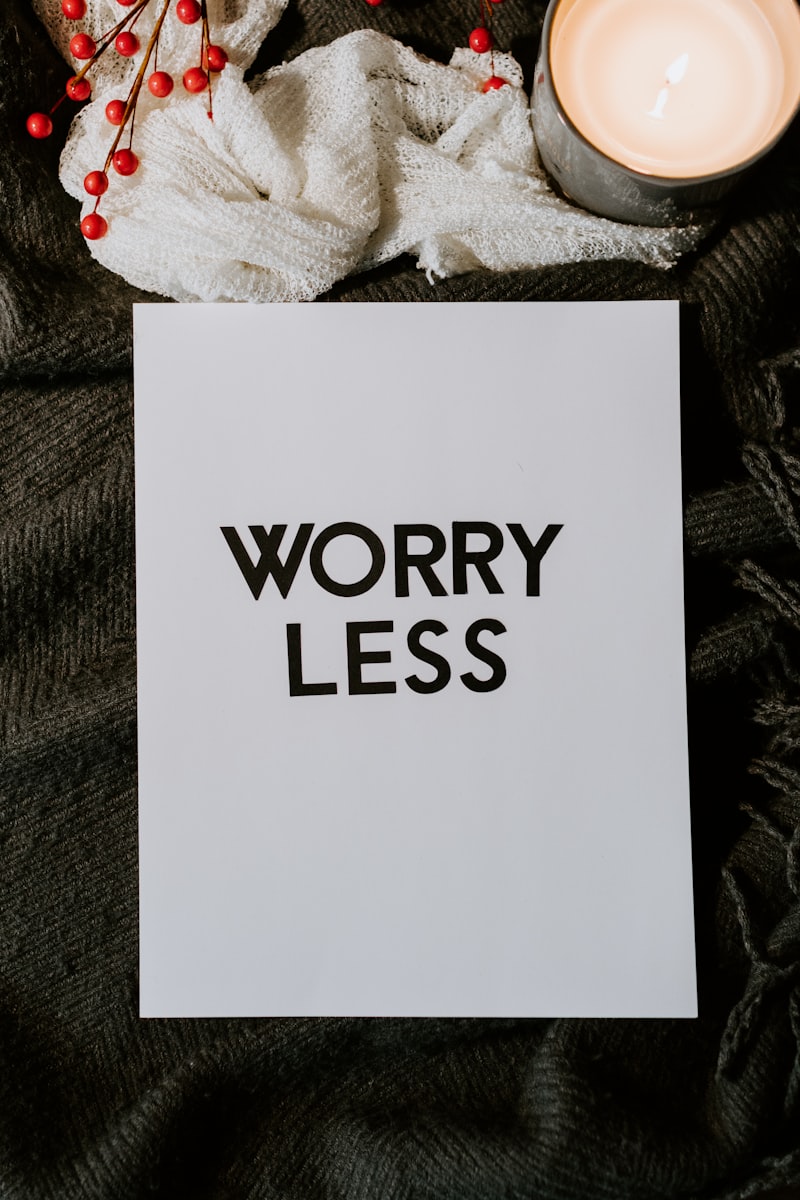
One powerful technique is mindfulness meditation. This practice involves focusing your attention on the present moment without judgment. By regularly practicing mindfulness, you can train your mind to stay calm and centered even in stressful situations. It’s like giving your mind a refreshing break amidst the chaos of daily life.
Another key method is progressive muscle relaxation. This involves tensing and then slowly relaxing each muscle group in your body, starting from your toes up to your head. It’s a great way to release physical tension and promote a sense of relaxation throughout your body. Imagine it like untangling knots in a rope, one by one, until it becomes smooth and easy to handle.
Journaling is also a fantastic tool for stress management. By putting your thoughts and emotions on paper, you can gain clarity about what’s bothering you and find healthier ways to cope. It’s like turning a jumble of thoughts into a clear roadmap that leads you to a calmer state of mind.
Exercise plays a crucial role too. Whether it’s a brisk walk, a yoga session, or hitting the gym, physical activity releases endorphins that improve your mood and reduce stress. It’s like shaking off the weight of the world with every step or stretch, leaving you feeling lighter and more resilient.
Lastly, don’t underestimate the power of a healthy lifestyle. Eating nutritious foods, getting enough sleep, and maintaining a balanced schedule can significantly impact your stress levels. Think of it as fueling your body and mind with the right ingredients for optimal performance.
Incorporating these personal development techniques into your daily routine can transform how you respond to stress. By taking proactive steps to nurture your well-being, you empower yourself to navigate life’s challenges with greater ease and resilience. Stress doesn’t have to weigh you down – with the right tools, you can rise above it and thrive.
Unlocking Calm: How Personal Development Techniques Can Revolutionize Stress Management
Personal development isn’t just about achieving success; it’s about cultivating inner peace and resilience. One of the most effective techniques is mindfulness meditation. By simply taking a few minutes each day to focus on your breath and observe your thoughts without judgment, you can reduce stress levels significantly. This practice trains your mind to stay present, preventing it from spiraling into anxious thoughts about the future or ruminating over the past.
Another invaluable tool in the personal development arsenal is goal setting. Setting clear, achievable goals gives you a sense of purpose and direction, which can mitigate the feeling of being overwhelmed by responsibilities. When you break down your goals into manageable steps and celebrate each small achievement, you build momentum and confidence, making it easier to handle stressors as they arise.
Moreover, practicing gratitude is a game-changer for stress management. Taking time to reflect on what you’re grateful for shifts your focus from what’s going wrong to what’s going right in your life. This positive mindset not only reduces stress but also enhances your overall well-being.
Effective stress management through personal development isn’t a one-size-fits-all approach; it’s about discovering what works best for you. Whether it’s through journaling, exercise, or seeking support from mentors or counselors, the key is to experiment with different techniques and incorporate them into your daily routine.
In essence, personal development techniques offer a holistic approach to stress management by addressing the root causes of stress and empowering you with tools to cultivate inner peace and resilience. By investing in your personal growth, you not only enhance your ability to handle stress but also unlock a more fulfilling and balanced life.
From Overwhelmed to Empowered: Personal Growth Strategies for Effective Stress Relief


One of the first steps towards managing stress effectively is to identify its sources. Is it work-related pressure, personal obligations, or a combination of factors? Understanding what triggers your stress is crucial in developing targeted strategies to combat it. Think of it as pinpointing the enemy so you can devise a plan to conquer it.
Once you’ve pinpointed your stress triggers, it’s time to arm yourself with effective coping mechanisms. These can range from mindfulness and deep breathing exercises to regular physical activity and adequate sleep. Imagine these techniques as your arsenal of tools, each one capable of disarming stress and restoring your inner balance.
A particularly potent strategy is the practice of mindfulness. This involves staying present in the moment without judgment, allowing you to observe your thoughts and feelings without becoming overwhelmed by them. It’s like stepping into a calm oasis amidst life’s chaotic desert, where you can find refuge and clarity.
Another effective approach is to cultivate a support network. Surround yourself with positive influences—friends, family, or even support groups—who can provide encouragement and perspective during challenging times. Picture them as your anchors, keeping you steady when the storm of stress tries to push you off course.
Lastly, don’t underestimate the power of self-care. Engage in activities that bring you joy and relaxation, whether it’s reading a book, pursuing a hobby, or simply taking a leisurely walk. These moments of self-care act like a shield, protecting your mental and emotional well-being from the onslaught of stress.
Mindfulness and Beyond: Innovative Personal Development Methods for Stress Reduction
Mindfulness, at its core, involves being fully present in the moment without judgment. It’s about cultivating awareness of your thoughts, feelings, and surroundings. This practice alone has shown remarkable benefits in reducing stress levels and promoting overall well-being. However, what makes it truly innovative is its integration with other complementary methods.
Imagine mindfulness as the anchor of a ship, keeping you grounded and steady amidst life’s turbulent seas. Now, picture complementary methods as the sails that catch the wind, propelling you forward towards personal growth and resilience. These methods can include cognitive behavioral techniques, which help reframe negative thought patterns, and positive psychology exercises, which focus on strengths and gratitude.
The beauty of combining these approaches lies in their synergy. Mindfulness enhances the effectiveness of cognitive techniques by providing a calm space to observe and change unhelpful thought patterns. Similarly, positive psychology amplifies mindfulness by fostering a mindset of optimism and appreciation.
Furthermore, innovative personal development methods often include somatic practices like yoga or tai chi, which integrate movement with mindfulness. These practices not only reduce physical tension but also deepen the mind-body connection, promoting holistic well-being.
In essence, mindfulness and beyond represent a paradigm shift in stress reduction and personal development. By embracing a multifaceted approach that blends mindfulness with cognitive techniques, positive psychology, and somatic practices, individuals can cultivate resilience, emotional balance, and a profound sense of inner peace. It’s about going beyond the surface and tapping into the interconnectedness of mind, body, and spirit for enduring wellness.
The Stress-Relief Revolution: Personal Development Tips to Transform Your Life
One of the fundamental pillars of stress relief is mindfulness. Simply put, mindfulness means being fully present in the moment, without judgment. It involves paying attention to your thoughts, feelings, and surroundings. By practicing mindfulness regularly, whether through meditation or simply taking a few deep breaths throughout the day, you can significantly reduce stress levels and increase your overall sense of well-being.
Another powerful tool in your stress-relief arsenal is physical exercise. Exercise isn’t just about staying fit; it’s also a potent stress buster. When you engage in physical activity, your body releases endorphins—natural chemicals that uplift your mood and reduce stress hormones like cortisol. Whether it’s a brisk walk in nature, a yoga session, or a high-intensity workout, find an exercise routine that suits your lifestyle and preferences.
Effective time management is another key aspect of personal development that can alleviate stress. Often, feeling overwhelmed stems from not knowing where to start or trying to tackle too much at once. By prioritizing tasks, setting realistic goals, and breaking larger projects into smaller, manageable steps, you can feel more in control of your workload and reduce stress significantly.
Moreover, nurturing healthy relationships is essential for emotional well-being. Surround yourself with supportive friends and family members who uplift you and provide a listening ear during challenging times. Building a strong support network can help buffer stress and provide a sense of belonging and security.
Lastly, don’t underestimate the power of self-care. Taking time for yourself isn’t selfish; it’s necessary for maintaining overall wellness. Whether it’s indulging in a hobby you love, pampering yourself with a hot bath, or simply getting enough sleep each night, prioritize activities that recharge your batteries and contribute to your happiness.
While stress may be a part of life, it doesn’t have to dominate it. By incorporating mindfulness, exercise, effective time management, nurturing relationships, and self-care into your daily routine, you can embark on a stress-relief revolution and transform your life for the better.
Harnessing the Power of Self-Improvement: Top Techniques for Managing Stress
One powerful method is mindfulness meditation. This ancient practice involves focusing your mind on the present moment, which can significantly reduce stress levels over time. By cultivating mindfulness, you develop a heightened awareness that allows you to respond to stressors with greater clarity and calmness.
Another invaluable tool is regular exercise. Physical activity releases endorphins, often referred to as the “feel-good” hormones, which naturally boost your mood and reduce stress. Whether it’s jogging, yoga, or even a brisk walk, finding an exercise routine that suits your lifestyle can work wonders for managing stress.
Time management is another key aspect of stress management. Often, stress arises from feeling overwhelmed by too many tasks and deadlines. Learning to prioritize tasks, delegate when possible, and schedule dedicated time for relaxation can help you regain control and reduce stress levels effectively.
Moreover, self-care practices such as adequate sleep, a balanced diet, and nurturing social connections are fundamental in combating stress. A well-rested body and mind are better equipped to handle challenges and bounce back from stressful situations.
Lastly, learning to say no is a crucial skill in managing stress. Setting boundaries and not overcommitting yourself can prevent stress from accumulating. Remember, it’s okay to prioritize your well-being and decline additional responsibilities when necessary.
Frequently Asked Questions
How do relaxation techniques contribute to stress relief
Learn how relaxation techniques like deep breathing and meditation effectively reduce stress levels by calming the mind and relaxing tense muscles. These methods promote a sense of well-being and can be easily integrated into daily routines to manage stress effectively.
Why is time management crucial for stress reduction
Learn how effective time management can significantly reduce stress by prioritizing tasks, optimizing productivity, and fostering a sense of control over daily responsibilities.
What role does physical exercise play in stress management
Learn how physical exercise contributes to stress management, enhancing mental well-being through stress reduction and the release of endorphins, promoting relaxation and improved mood.
How can mindfulness help in reducing stress levels
Learn how mindfulness techniques can effectively reduce stress levels by fostering present-moment awareness and promoting relaxation responses in the body.
What are personal development techniques for managing stress
Learn effective personal development techniques to manage stress, including mindfulness practices, time management strategies, regular exercise routines, and seeking social support. These methods help in reducing stress levels and improving overall well-being.


